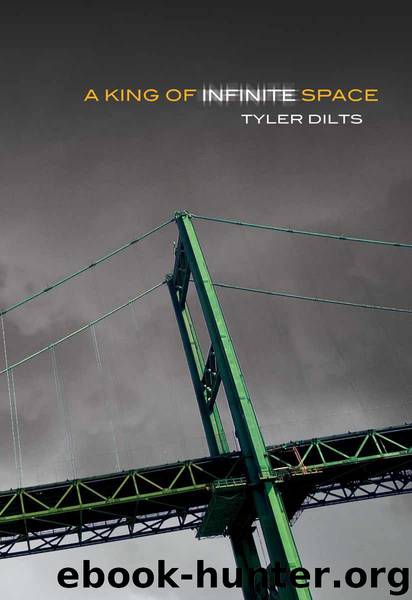

Later, I would wonder what was worse - that I had exploited Megan’s memory in such a way, or that it had worked so well.” To get close to a potential suspect - also a widower - Danny uses his tragedy as a lever: “We spent almost an hour there in his office,” he reflects, “and by the time we finished, Daryl probably thought we were pals. This is a classic noir conceit, the detective with a personal stake, and as “A King of Infinite Space” progresses, Dilts exposes Danny’s history in the evidence he pursues. “It may sound cold, but they need to be objectified, viewed as a thing, simply a piece of meat, nothing more than an object to be studied for evidence.… Once you begin to imagine glowing green eyes and chestnut hair flowing in the wind … you start missing the little things - and it’s the little things that make the story.” “The last thing you want to do while standing over a victim’s body is to imagine them alive,” Danny explains.

In his 30s, a bit too fond of Grey Goose vodka, he is lonely, widowed after his wife, Megan, died in a car crash on Interstate 5.įor him, the danger of the case is that it offers too many points of identification, from the books on Beth’s shelves that he’d studied in college (“A Tale of Two Cities,” “Heart of Darkness,” “Moby-Dick,” “Huckleberry Finn”) to the odd coincidence that, years before, she had attended his wedding as the date of a friend. Revolving around the brutal killing of Beth Williams, a high school English teacher, “A King of Infinite Space” takes its time developing, moving between the investigation and the tattered fragments of Danny’s life. What is murder, after all, but the expression of a capricious universe, in which bad things happen to good people and a cop like Danny is left to sort out the mess? This is the question at the center of Dilts’ vivid novel, which is a police procedural with an existential edge. “I can’t go on, I’ll go on,” Samuel Beckett wrote, in a line Dilts could have used as an epigraph. Then, there’s his narrator, a Long Beach police detective named Danny Beckett, as steeped in the absurdities of existence as the playwright for whom, presumably, he is named.

Tyler Dilts doesn’t waste any time establishing the intentions of his debut mystery, “A King of Infinite Space.” First, there’s that title, drawn from “Hamlet”: “O God, I could be bounded in a nutshell and count myself a king of infinite space, were it not that I have bad dreams.”


 0 kommentar(er)
0 kommentar(er)
